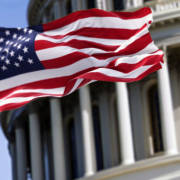 By Rose Oswald Poels
By Rose Oswald Poels
This year was a very busy one from a banking regulatory perspective with WBA and the industry engaging regulators on many different issues. As you look ahead to the new year, it is helpful to understand from the banking agencies’ perspectives the key issues they identify that are facing the industry.
The following summarizes the most recent risk perspective reports from the Office of the Comptroller of the Currency (OCC), the Federal Reserve Board (FRB), and the Federal Deposit Insurance Corporation (FDIC), and will offer insight to bankers as you evaluate and revise risk strategies for the upcoming year:
OCC Semiannual Risk Perspective, Fall 2023
The OCC’s Fall 2023 Semiannual Risk Perspective presents data in five main areas — the operating environment, bank performance, special topics in emerging risks, trends in key risks, and supervisory actions. OCC reported that the overall strength of the federal banking system remains sound and that OCC expects banks to remain diligent and adhere to prudent risk management practices across all risk areas. Additionally, OCC stated that banks should continue to guard against complacency to ensure each maintains the ability to withstand potential future economic challenges.
The OCC highlighted credit, market, operational, and compliance risks, as the key risk themes. Highlights from the report include that:
- Credit risk is increasing due to higher interest rates, increasing risk in CRE lending, prolonged inflation, declining corporate profitability, and the potential for slower economic growth. Key performance indicators are beginning to show signs of borrower stress across asset classes.
- Rising deposit rates, broader market liquidity contraction, and increased reliance on wholesale funding started to impact net interest margins through the first half of 2023. Competition for deposits and higher interest rates are raising deposit rates. OCC reported deposit and liquid asset trends stabilized in the latter half of 2023, but the levels were supported by increased reliance on wholesale funding. Increases in interest rates are negatively impacting investment portfolio values.
- Operational risk is elevated. Cyber threats continue. Banks continue to leverage new technology to further digitalization efforts, offering innovative products and services to meet customer demands. OCC warned that increasing digitalization efforts can also heighten risk of fraud and error, including fraud targeting peer-to-peer and other faster payment platforms.
- Compliance risk remains elevated. OCC believes this is due to the heightened focus on ensuring equal access to credit and fair treatment of consumers, the expanded use of innovative technologies for product and service delivery, and expanded partnerships with third parties, such as financial technology firms, and increases in BSA/AML risk.
Federal Reserve Financial Stability Report, October 2023
The FRB’s latest Financial Stability Report was released in October in which FRB reports conditions affecting the stability of the U.S. financial system by analyzing vulnerabilities related to valuation pressures, borrowings by business and households, financial-sector leverage, and funding risks. Similar to the OCC, FRB reported that the banking sector remains sound overall, and that most banks continue to report capital levels above regulatory requirements. Nevertheless, FRB reports a subset of banks continued to face funding pressures.
The FRB’s report includes a discussion which considers possible interactions of existing domestic vulnerabilities with several potential near-term risks, including international risks. Survey contacts reflect the effect of persistent inflation and monetary tightening, insights regarding CRE, the reemergence of banking-sector stress, market liquidity strains and volatility, fiscal debt sustainability, and climate-related financial risks.
FDIC Risk Review 2023 Report
The latest FDIC Risk Review report incorporates data for 2022 through first quarter 2023, with insights related to the stress to the banking sector that emerged in March 2023. The report reflects risks on the key credit, market, operational, crypto-asset, and climate-related financial risks facing banks.
Regarding key credit risks, FDIC reported asset quality remained generally favorable as of first quarter 2023 despite modest deterioration. FDIC believes weaker economic conditions and higher interest rates may challenge bank loan portfolios, including credit card, C&I, residential real estate, and CRE loans.
From a markets perspective, FDIC reported market risks were primarily related to the effects of higher interest rates. Also, deposit outflows along with high levels of unrealized losses could pressure liquidity for some banks. FDIC reported the banking industry benefited from strong loan growth and higher NIMs in 2022, but higher funding costs reduced NIMs.
FDIC also reported that operational risks, including cybersecurity risks and risks related to illicit financial activity, remained elevated across the banking industry. FDIC also reported that crypto assets continue to present novel and complex risks that FDIC believes are difficult to fully assess. From FDIC’s perspective, climate-related financial risks include physical risk and transition risk, and FDIC’s report focuses on physical risk from severe weather and climate events.




 By Rose Oswald Poels
By Rose Oswald Poels